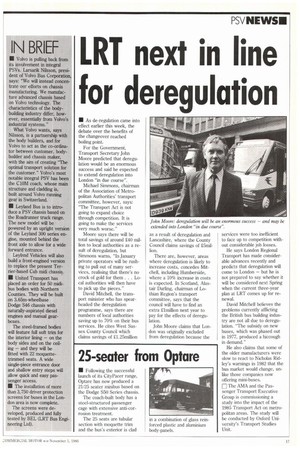LRT next in line for deregulation
Page 19

If you've noticed an error in this article please click here to report it so we can fix it.
• As de-regulation came into effect earlier this week, the debate over the benefits of the changeover reached boiling point.
For the Government, Transport Secretary John Moore predicted that deregulation would be an enormous success and said he expected to extend deregulation into London "in due course".
Michael Simmons, chairman of the Association of Metropolitan Authorities' transport committee, however, says: "The Transport Act is not going to expand choice through competition. It is going to make the services very much worse."
Moore says there will be total savings of around £40 million to local authorities as a result of deregulation, but Simmons warns, "In January private operators will be rushing to pull out of many services, realising that there's no crock of gold for them . . . Local authorities will then have to pick up the pieces."
David Mitchell, the transport minister who has spearheaded the deregulation programme, says there are numbers of local authorities saving up to 70% on their bus services. He cites West Sussex County Council which claims savings of £1.25million
as a result of deregulation and Lancashire, where the County Council claims savings of £51nillion.
There are, however, areas where deregulation is likely to increase costs, concedes Mitchell, including Humberside, where a 10% increase in costs is expected. In Scotland, Alastair Darling, chairman of Lothian Region's transport committee, says that the council will have to find an extra 2lmillion next year to pay for the effects of deregulation.
John Moore claims that London was originally excluded from deregulation because the services were too inefficient to face up to competition without considerable job losses.
He says London Regional Transport has made considerable advances recently and predicts that deregulation will come to London — but he is not prepared to say whether it will be considered next Spring when the current three-year plan at LRT comes up for renewal.
David Mitchell believes the problems currently afflicting the British bus building industry are not all due to deregulation. "The subsidy on new buses, which was phased out in 1977, produced a hiccough in demand."
He also claims that some of the older manufacturers were slow to react to Nicholas Ridley's warnings in 1982 that the bus market would change, unlike those companies now offering mini-buses.
D The AMA and the Passenger Transport Executive Group is commissioning a study into the impact of the 1985 Transport Act on metropolitan areas. The study will be conducted by Oxford University's Transport Studies Unit.




















































































